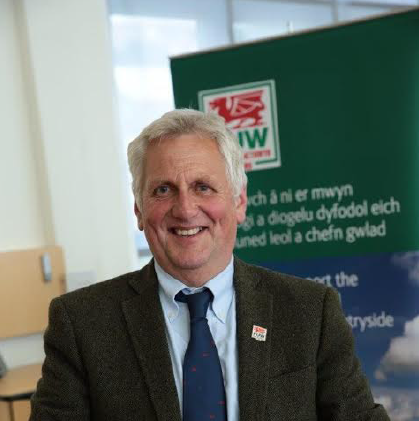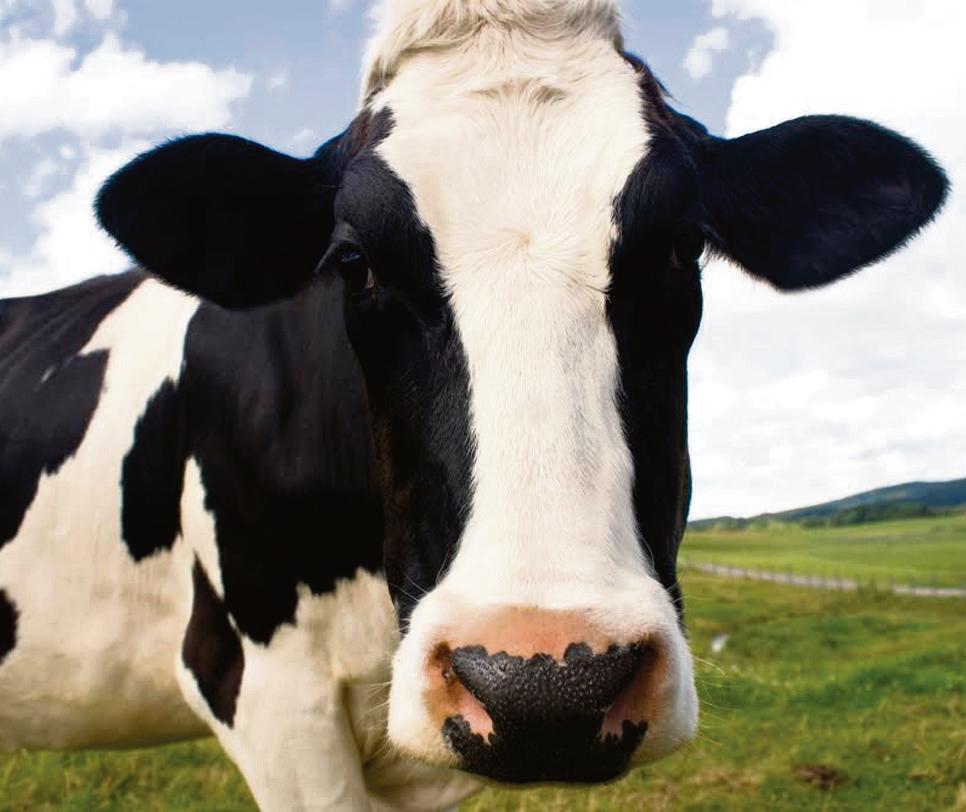Farming
Brexit an opportunity: FUW


Wales must create a rural powerhouse:
Glyn Roberts, FUW
THE FARMERS’ UNION OF WALES has long known that the family farm is the cornerstone of our economy and culture here in Wales and, as such, Wales has an opportunity to be a rural economic powerhouse post -Brexit.
Speaking at the FUW Press Conference on Sunday (Jul 17) ahead of the Royal Welsh Show, Union President Glyn Roberts said: “In these times of political uncertainty, only a few things are constant: the grass will continue to grow and it will probably rain soon!
“So we are blessed with those strategic resources that make our industry successful.”
Much political and media attention has recently been focussed on risks to jobs and the local economy in and around the M4 corridor in South Wales – and quite rightly so, the FUW President told delegates.
“But you may be surprised to learn that there are almost as many people engaged in the milk industry in Pembrokeshire as there are people making a living in our Welsh steel industry. Yet there is a clear imbalance in political focus for supporting these two very important industries – an imbalance which also extends to all our agricultural sectors,” said Glyn Roberts.
He added that his aspiration and indeed the intention of the Farmers’ Union of Wales is to change this.
“We want to see the value and importance of the rural economy truly recognised, and to build a visible and valued Rural Powerhouse – not something that attracts industrial focus in a small geographic area, like the north-east Wales ‘powerhouse’ built around foreign manufacturing; what is needed is recognition of the fact that 80% of our land mass is rural; that more than a third of Wales’ population live in rural areas; and that farming is the bedrock of our rural communities, without which vast direct and indirect contributions to Wales’ economy as a whole would disappear,” continued the Union President.
He told delegates that the Rural Powerhouse the FUW envisages that it will take all that is valuable in our rural economies and maximise their outputs and impact. It will recognise the interactions that exist in rural Wales, the communities that work and live together, the networks that support each other and of course the importance of rural Wales to our culture.
Glyn Roberts further stated: “If you want a clear indication of the cultural importance of farming, you need only consider this: in Ceredigion, less than 50% of the population now speak Welsh. But within the farming community, the percentage is close to 100%.
“Consider also the value of the Young Farmers Clubs playing such diverse and vital roles in their communities, where they also protect our culture and language so very effectively. There can be no doubt that farming holds these groups together and makes them a real force in our rural communities.”
The message from the FUW is clear – this is not just about farming; it is about the wider recognition of how farming matters, where supply chains are involved, how money circulates in the local economy, where people survive, where profits are made, communities are sustained and our culture continues to thrive.
Glyn Roberts, in his speech, asked: “Why is it that the supply chains, which employ millions and ultimately supply the food we eat, through our dairies, slaughterhouses and other processors, don’t even appear on the radar of the National Infrastructure Commission? Why do our rural areas not attract the sort of attention and funding the M4 relief road has attracted given their direct importance to our economy, not to mention other key related industries such as tourism – and, of course, feeding people?”
Addressing the upcoming exit from the European Union, the FUW President said: “Since June 23, we have all been immersed in a sea of political turmoil and uncertainty: we know something will happen, we know it will be big and far-reaching, but we don’t know when it will start or when it will end.
“For our part, we have made it clear since the referendum result was announced that matters should be progressed at a sensible pace, and I am pleased to have seen increasing numbers of politicians and commentators coming over to our point of view.”
Glyn Roberts asked those in power to resist the temptation to trigger Article 50 of the Lisbon Treaty prematurely for a number of reasons, not least because of the vast amount of work which needs to be undertaken to repeal, or redraft, the 5,500 acts relating to agriculture and the rural economy; the likely timescales over which trade agreements can be negotiated; the risk that elections in France and Germany would impact on negotiation time and the huge job of unravelling the current CAP and our commitments made under the Multi- Annual Financial Framework.
“We know what we’ve potentially got until 2020, so let’s stick with it. Let’s maximise the return on what is planned.
“Moving at speed towards Brexit brings with it huge risks, so we certainly don’t want speed – but there is certainly a need for haste in terms of what can be done to prepare for a post-Brexit world, and provide as much clarity as possible in terms of removing confusion, uncertainty and rumour,” he said.
Staying within the Multiannual Financial Framework timescale, as favoured by the FUW, would allow precisely this according to the FUW.
“Setting out detailed expectations for life post-Brexit would of course be inappropriate at this stage, but we have already outlined key overarching priorities for Welsh agriculture to all the political parties and, as a democratic organisation, we have initiated a process of consultation with members which will be moved forward at an appropriate pace.
“We are also pleased to be involved with the Welsh Government discussions to plan the future, and so we return to the issue of the creation of a Welsh rural powerhouse.
“Whatever concerns we have, the decision made on June 23, coupled with recognition of the importance of agriculture and our rural communities, provides us with an opportunity to create something that is absolutely right for Wales in the near, medium and long term,” said FUW President Glyn Roberts.
Farming
Welsh Conservatives warn climate plans could mean fewer livestock on Welsh farms

THE WELSH CONSERVATIVES have challenged the Welsh Government over climate change policies they say could lead to reductions in livestock numbers across Wales, raising concerns about the future of Welsh farming.
The row follows the Welsh Government’s decision, alongside Plaid Cymru and the Welsh Liberal Democrats, to support the UK Climate Change Committee’s Fourth Carbon Budget, which sets out the pathway towards Net Zero greenhouse gas emissions by 2050.
The Carbon Budget, produced by the independent Climate Change Committee (CCC), states that meeting Net Zero targets will require a reduction in agricultural emissions, including changes to land use and, in some scenarios, a reduction in livestock numbers.
During questioning in the Senedd, the Welsh Conservatives pressed the Deputy First Minister and Cabinet Secretary for Climate Change and Rural Affairs on whether the Welsh Government supports reducing livestock numbers as part of its climate strategy.
Speaking after the exchange, Welsh Conservative Shadow Cabinet Secretary for Rural Affairs, Samuel Kurtz MS, said the Welsh Government could not distance itself from the implications of the policy it had backed.
Mr Kurtz said: “By voting in favour of these climate change regulations, Labour, Plaid Cymru and the Liberal Democrats have signed up to the UK Climate Change Committee’s call to cut livestock numbers in Wales, and they cannot dodge that reality.
“The Deputy First Minister’s smoke-and-mirrors answers only confirm what farmers already fear: that Labour, along with their budget bedfellows in Plaid and the Lib Dems, are prepared to sacrifice Welsh agriculture in pursuit of climate targets.”
He added that the issue came at a time of growing pressure on the farming sector, pointing to uncertainty over the proposed Sustainable Farming Scheme, the ongoing failure to eradicate bovine TB, nitrogen pollution regulations under the Nitrate Vulnerable Zones (NVZs), and proposed changes to inheritance tax rules affecting family farms.
The Welsh Government has repeatedly said it does not have a target to forcibly reduce livestock numbers and has argued that future emissions reductions will come through a combination of improved farming practices, environmental land management, and changes in land use agreed with farmers.
Ministers have also said the Sustainable Farming Scheme, which is due to replace the Basic Payment Scheme, is intended to reward farmers for food production alongside environmental outcomes, rather than remove land from agriculture.
The UK Climate Change Committee, which advises governments across the UK, has stressed that its pathways are based on modelling rather than fixed quotas, and that devolved governments have flexibility in how targets are met.
However, farming unions and rural groups in Wales have warned that policies focused on emissions reduction risk undermining the viability of livestock farming, particularly in upland and marginal areas where alternatives to grazing are limited.
The debate highlights the growing tension between climate targets and food production in Wales, with livestock farming remaining a central part of the rural economy and Welsh cultural identity.
As discussions continue over the final shape of the Sustainable Farming Scheme and Wales’ long-term climate plans, pressure is mounting on the Welsh Government to reassure farmers that climate policy will not come at the expense of the sector’s survival.
Farming
FUW Insurance Services appoints Paul Jameson as non-executive director

Experienced insurance and risk specialist joins board as long-serving director retires
FUW INSURANCE SERVICS LTD, Wales’ leading specialist agricultural insurance broker, has announced the appointment of Dr Paul Jameson as a non-executive director.
Dr Jameson brings extensive experience in insurance and risk management, having worked as an actuary and senior executive within subsidiaries of major global insurers including Allianz, Munich Re, Legal & General and Wakam. He has held chief risk officer roles since 2020.
During his career, Dr Jameson has led multidisciplinary teams spanning actuarial services, risk management, compliance, audit, legal and marketing approvals, giving him broad experience in both strategic oversight and operational governance.
Speaking following his appointment, Dr Jameson, who lives in Colwyn Bay, North Wales, said he was looking forward to supporting the farming sector in Wales.
He said: “I am delighted to join FUW Insurance Services and would like to thank Ann, Guto and the rest of the team for their warm welcome.
“I have been impressed by the passion and commitment of the board to the farming community, and by its ambition to grow and diversify the insurance business. I am keen to support the farming profession and help ensure the continued success of the sector in Wales, particularly during periods of economic and geopolitical uncertainty.
“I hope my experience in the insurance sector will help the business build on its successes and continue to grow, especially as it explores new commercial opportunities and innovative avenues for expansion.”
Ann Beynon OBE, chair of the FUW Insurance Services board, said Dr Jameson’s expertise would be a significant asset to the organisation.
She said: “We are delighted to welcome Dr Paul Jameson to the board. His depth of experience in insurance and his understanding of risk management will be invaluable as we continue to develop and diversify our services.
“Paul’s insight and strategic perspective will help us navigate a changing insurance market, identify new opportunities for innovation and growth, and strengthen the services we provide to our customers.”
Dr Jameson’s appointment follows the retirement of Ken Isherwood, who has stepped down from the board after more than a decade of service.
Paying tribute, Ann Beynon said: “Ken’s integrity, wisdom and deep knowledge of the insurance industry have underpinned much of our success.
“It has been a privilege to work alongside him, and we wish him every happiness in his well-earned retirement.”
Community
Badger Trust launches manifesto ahead of 2026 Senedd elections

THE BADGER TRUST has published a new Cymru Badger Manifesto calling on candidates standing in the 2026 Senedd elections to commit to a science-led approach to bovine tuberculosis (bTB) and to maintain Wales’ current policy of not culling badgers.
The manifesto, released on Wednesday (Dec 10) as part of the charity’s Badgers Belong Here / Mae Moch Daear yn Perthyn Yma campaign, sets out the organisation’s position on badger protection, wildlife crime and bTB control, and urges politicians to reject calls for the reintroduction of culling in Wales.
Badger Trust argues that political decisions taken during the next Senedd term will be critical to the future of badgers, which it describes as culturally and ecologically significant to Wales. The charity says badgers have been present in Wales for more than 250,000 years and remain part of Welsh folklore, place names and rural identity.
Five key commitments
The manifesto outlines five commitments the charity is asking Senedd candidates to support, including defending what it describes as science-led policy on bTB, challenging misinformation in public debate, strengthening enforcement against wildlife crime, recognising badgers as part of Welsh heritage, and supporting local volunteer badger groups.
According to Badger Trust, 140 incidents of badger-related wildlife crime have been recorded in Wales since 2020, which it says highlights the need for improved reporting and enforcement.
The charity also points to the work of six active badger groups across Wales, which it says assist with rescuing injured animals, monitoring setts, recording road casualties and supporting local authorities.
bTB policy in Wales and England
Wales has not carried out widespread badger culling as part of its bTB control strategy, instead focusing on cattle testing, biosecurity measures and herd management.
Badger Trust claims that new herd incidents of bTB in Wales fell by more than 40% between 2010 and 2024, which it attributes to cattle-based controls rather than wildlife intervention.
The charity contrasts this with England, where it says almost 250,000 badgers have been culled over the past decade as part of bTB control programmes. It argues that bTB rates in England remain higher than in Wales and that the evidence does not show culling alone to be responsible for reductions in disease.
Disputed claims over culling
The manifesto challenges the frequently cited claim that badger culling in England led to a 56% reduction in bTB in cattle. Badger Trust says this figure has been misinterpreted and that studies cited in support of culling also involved additional measures such as enhanced cattle testing and biosecurity.
The charity points to statements from researchers and official correspondence which, it says, indicate that reductions in bTB cannot be attributed solely to culling.
Supporters of culling, including some farming groups, continue to argue that wildlife control should remain an option as part of a wider disease management strategy, particularly in areas with persistent infection. The Welsh Government has previously said it keeps its bTB policy under review in line with emerging evidence.
Call to candidates
Nigel Palmer, CEO of Badger Trust, said Wales demonstrated that bTB could be tackled without killing wildlife.
He said: “Wales is a world-leading example of how to address bovine TB through evidence-based policy. The progress made here shows that culling is not necessary, and we urge Senedd candidates to stand by the science.”
The manifesto is available in both Welsh and English and will be circulated to political parties and candidates ahead of the 2026 election.
-

 Crime2 days ago
Crime2 days agoMilford Haven man jailed after drunken attack on partner and police officers
-

 News5 days ago
News5 days agoDyfed-Powys Police launch major investigation after triple fatal crash
-

 Crime2 days ago
Crime2 days agoTeenager charged following rape allegation at Saundersfoot nightclub
-

 Crime3 days ago
Crime3 days agoMan charged with months of coercive control and assaults
-

 Crime4 days ago
Crime4 days agoMan sent to Crown Court over historic indecent assault allegations
-

 Crime6 days ago
Crime6 days agoMan spared jail after baseball bat incident in Milford Haven
-

 Crime4 days ago
Crime4 days agoMilford Haven man admits multiple offences after A477 incident
-

 Crime3 days ago
Crime3 days agoWoman ‘terrified in own home’ after ex breaches court order





















